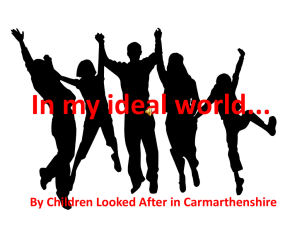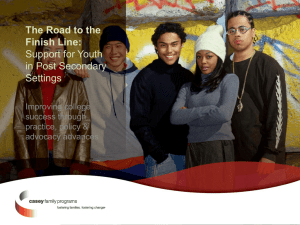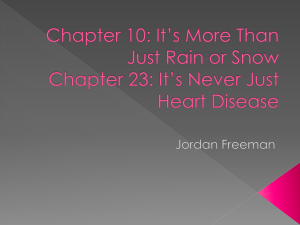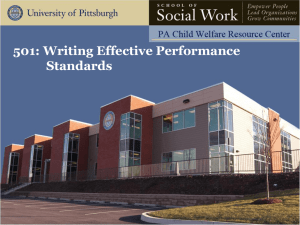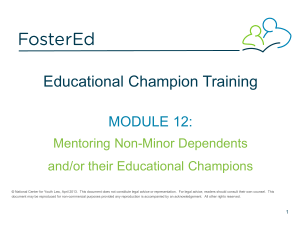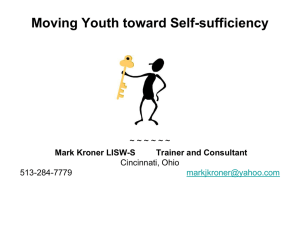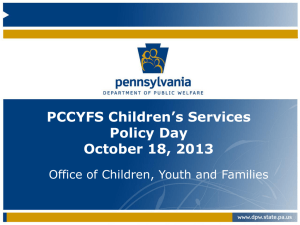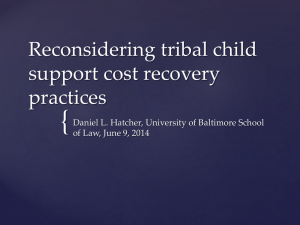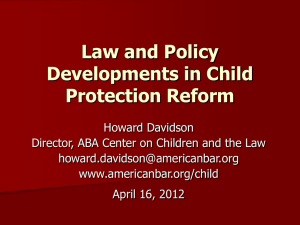928: Teaching Life Skills to Foster Youth
advertisement
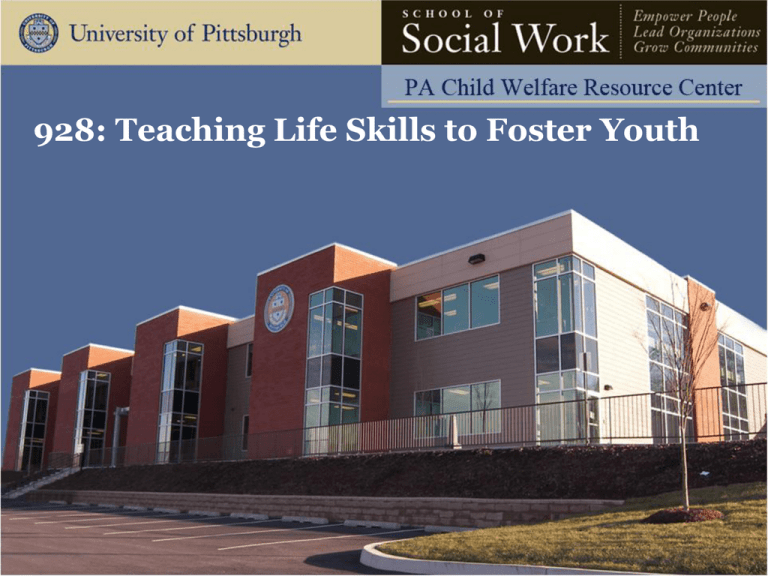
928: Teaching Life Skills to Foster Youth Learning Objectives • Identify the assessment needs of foster youth; • Recognize and interpret the learning levels of foster youth; • Develop plans for teaching life skills to foster youth based on their identified learning levels; and • Identify and explain practical resources you can use to teach “hard” and “soft” life skills. The Pennsylvania Child Welfare Resource Center 928: Teaching Life Skills to Foster Youth 2 The Pennsylvania Child Welfare Resource Center 928: Teaching Life Skills to Foster Youth 3 Learning Life Skills • • • • • • How did you learn life skills growing up? What did you learn? Who taught you? How did they teach you? When did you know you had learned them? Is this how you teach your foster children life skills? – Why or why not? The Pennsylvania Child Welfare Resource Center 928: Teaching Life Skills to Foster Youth 4 What does the research say? “The evaluation calls into question the notion that classroom-based life skills training, in and of itself, is likely to have much impact on the wellbeing of foster youth in transition to adulthood.” • Administration of Children and Families, 2008 The Pennsylvania Child Welfare Resource Center 928: Teaching Life Skills to Foster Youth 5 Teaching Life Skills Assessment Application Results Monitoring The Conversation Instruction Learning Plan The Pennsylvania Child Welfare Resource Center 928: Teaching Life Skills to Foster Youth 6 Casey Life Skills Assessment: A Free Tool The Pennsylvania Child Welfare Resource Center 928: Teaching Life Skills to Foster Youth 7 “Hard” Skills vs. “Soft” Skills • Hard Skills – Task-based and completed sequentially – E.g. banking, budgeting, doing laundry, cleaning, changing a light bulb • Soft Skills – Based on personal and social strengths – E.g. positive communication, networking, conversations with adults, positive conflict resolution The Pennsylvania Child Welfare Resource Center 928: Teaching Life Skills to Foster Youth 8 Understanding Individual Learning Styles • Auditory • Visual • Kinesthetic/Tactile The Pennsylvania Child Welfare Resource Center 928: Teaching Life Skills to Foster Youth 9 Learning Levels Awareness Knowledge and Understanding Knows how to… Can or is able to… The Pennsylvania Child Welfare Resource Center 928: Teaching Life Skills to Foster Youth 10 Knows How To… The Pennsylvania Child Welfare Resource Center 928: Teaching Life Skills to Foster Youth 11 Can or is able to… The Pennsylvania Child Welfare Resource Center 928: Teaching Life Skills to Foster Youth 12 Teaching Life Skills • Answer the following questions based on your scenario: – What learning level is this youth on? Why? – What is this youth’s dominant learning style? Why? – Develop a plan to teach this youth the life skill discussed in the scenario The Pennsylvania Child Welfare Resource Center 928: Teaching Life Skills to Foster Youth 13 Life Skills Resources: Instruction and Application • • • “Ready, Set, Fly! A Parent’s Guide to Teaching Life Skills” – www.caseylifeskills.org Life Skills lesson plans for youth with disabilities - http://www.nsttac.org/ PA Youth in Transition Network https://sites.google.com/site/payouthintransitionnetwork/ The Pennsylvania Child Welfare Resource Center 928: Teaching Life Skills to Foster Youth 14
